Flags, parades and politics - is there a solution?
- Published
- comments
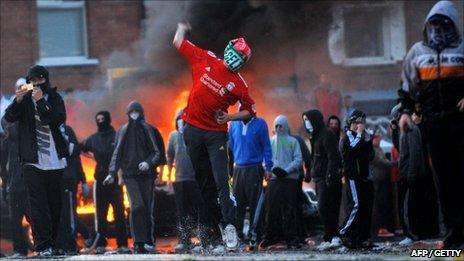
16 officers were hurt in Tuesday's violence
So should we be depressed about the annual ritual rioting in Ardoyne? Or heartened that the number of police officers injured was fewer than last year, and the disorder shorter in duration?
The police say 16 officers were hurt on Tuesday, compared to 55 in 2010. A republican source told me the rioting "wasn't a patch on last year".
In contrast to last year, nationalists did not block the Crumlin Road and the Orange parade itself passed by without trouble.
That said, the pictures still look bad enough and, as the trade union leader Peter Bunting put it, the perception of Northern Ireland as unstable going out around the world will probably count for more than any initiatives on local corporation tax.
In 2010 the PSNI Assistant Chief Constable Alistair Finlay stirred controversy when he accused the first and deputy first ministers of not doing enough in tackling and condemning the violence.
ACC Finlay talked about the need for the politicians to have "a plan to meet this type of issue next time it comes around rather than waiting until it inevitably comes next year".
Furious
He also referred to the lack of progress then made on the so called Cohesion Sharing and Integration strategy, which is meant to chart a way towards better community relations.
This year there's been no repeat of those comments from ACC Finlay.
Perhaps that's because he was chastened by the furious response from politicians last year, or maybe he's had his fill of controversy, following his apology to loyalists about the way in which the PSNI removed Union flags around Ballyclare.
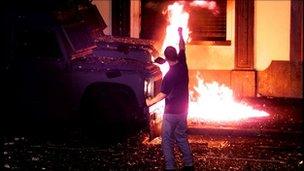
Rioters threw petrol bombs, bricks, stones, fireworks and bottles at officers during the trouble
Or just possibly he thinks mainstream politicians in North Belfast are doing their best.
Certainly it is evidence of changing times when the DUP North Belfast MP Nigel Dodds pays tribute to the efforts of nationalists to keep the atmosphere calm.
Moreover, Gerry Kelly was very overt in liaising with senior police officers on the ground over their handling of the disturbances.
Sinn Fein retains influence and overwhelming electoral support in an area like Ardoyne. But the republican movement's transition into the mainstream means it can't use the kind of strong arm tactics which used to guarantee it control of the streets.
The fact that two counter protests took place - a parade by the Greater Ardoyne Residents Collective (who insist "we are residents not dissidents") and a static demonstration by the Crumlin Ardoyne Residents Association (who appear more in tune with Sinn Fein thinking) underlines the division within nationalism about how best to handle the Orange parades.
So what of ACC Finlay's hoped-for "plan"? Following their Hillsborough deal, both the DUP and Sinn Fein were poised to dump the Parades Commission and replace it with a series of less than snappily-titled bodies (including the Public Assemblies, Parades and Protests Body).
Fuss
They would come under the umbrella of the First and Deputy First Minister's office. But these proposals were abandoned last autumn when the Orange Order decided it could not endorse them.
During this summer the Order has had a few fresh run-ins with the newly-appointed commission - most notably about the playing of hymns in east Belfast.
In the weeks to come we could see action taken over apparent breaches in the commission's determinations - action which could involve one of the new Orange Grandmaster Edwin Stevenson's closest advisers.
Then there was the fuss about the commission's U-turn in relation to marchers being able to unfurl the Union flag on the Crumlin Road.
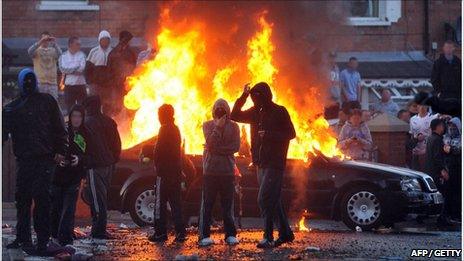
A crowd of about 200 people were involved
But if the Orange Order is keen on replacing the Parades Commission, it will have to take the initiative itself. The two main parties remain ready to re-activate their replacement, but don't want to find themselves hung out to dry again.
DUP sources believe the Orange Order is reviewing its position and the politicians are waiting to see what that review leads to in the autumn before making any further move.
Of course, whatever you call the quango in charge of parades, it won't always be able to please both sides to these intractable local disputes.
That's where long-term community relations work kicks in. Shortly after ACC Finlay made his comments last year, the Executive published its draft Cohesion, Sharing and Integration strategy (CSI).
As I said at the time, a lot of the initial CSI document seemed woolly. It drew fire from those, like the Rowntree Trust, who reckoned it replaced a commitment to a shared future with a mutual accommodation between two sides happy to keep their distance.
According to a written answer just given to Alliance's Anna Lo, the five main Stormont parties have now "agreed to appoint representatives to a working group that will seek consensus on issues" enabling the publication of a final CSI strategy.
A "road map" will set out the steps and timetable for the strategy and an action plan will be brought forward.
The OFMDFM says the strategy should be ready in the autumn and the action plan in December.
To paraphrase the old Nazi saying, when I hear jargon like "road map", "strategy" and "action plan" I reach for my revolver.
Indefensible
The layman will wonder what practical difference any of this "CSI speak" will make to the visceral hatreds which we have all seen laid bare in flashpoint areas around Belfast in recent weeks.
Apart from the violence itself, the last few days have once again emphasised the gulf in attitudes.
For example, whilst loyalists felt it was indefensible for the police to touch the Union flags around Ballyclare. many deemed it perfectly acceptable to burn Irish tricolours and posters of the other side's representatives on their eleventh night bonfires (many of the Sinn Fein Belfast Mayor's posters were incinerated on loyalist bonfires due to receive grant aid from his council).
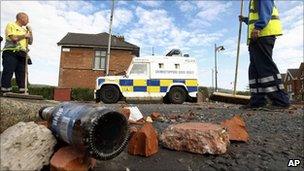
A "road map" will set out the steps and timetable for the strategy and an action plan will be brought forward
There is much good work being done away from the headlines. For example, the council and IFA-backed George Best Street League is keeping 320 young people from the North Belfast Ardoyne, Marrowbone and Oldpark areas busy playing football during the evenings this week.
But for some disaffected youth, soccer can't compete with "recreational rioting".
DUP sources say that whilst relations have improved between the middle classes, many Protestant working class areas feel the political process has left them behind.
Peter Robinson has asked the Lagan Valley MP Jeffrey Donaldson to head a working group which will examine how these areas can be reconnected with the process, looking at issues like deprivation, educational under-achievement (an issue pioneered by the former MLA Dawn Purvis) and political alienation.
The DUP says the initiative dates back to before the Assembly elections, but is only getting off the ground now.
Mr Donaldson acknowledges the need for loyalists to build bridges with those on the other side of the sectarian divide, but adds that you can't erect a bridge unless you are certain its supports on either side are strong.
It's an admission that mainstream unionists need to reconnect with their community if they are to be able to deliver on any deals in the future.
Looking ahead, the Parades Commission isn't the only quango whose future could be in doubt.
Earlier this week, appearing on Good Morning Ulster, the Irish News columnist Brian Feeney called for the abolition of the Community Relations Council, citing the recent trouble and the expansion in the number of peace walls as evidence of its failure.
Mr Feeney says the OFMDFM's appointment of an emissary to deal directly with the east Belfast violence underlined the irrelevance of the CRC.
The Community Relations Council's chief executive Duncan Morrow hit back, arguing that the work funded by his body has been vital "as a counter to those who would seek to stoke up sectarian tensions".
Brian Feeney has been a harsh critic of the CRC for years, but he isn't alone.
Sinn Fein sources don't hide their antipathy to what they call the "useless community relations industry".
This antipathy goes back to the republican perception that the CRC represents an NIO/Alliance party mindset that if only the "two tribes" started to behave themselves the problem would be sorted.
'Danegeld'
During an explosive Stormont Committee meeting on 22 June, Sinn Fein's Francie Molloy made no attempt to hide his disdain for the CRC, whilst the DUP's Trevor Clarke wasn't any kinder towards the quango, accusing it of patronising MLAs and trying to take credit for the Stormont institutions (both charges the CRC representatives rejected).
Under the old "Shared Future" strategy, the CRC was meant to be the key delivery body.
The question is whether this will change under the new Cohesion, Sharing and Integration policy.
Rather than a single replacement body, one alternative which has been suggested is giving community relations work to the local councils.
However, the failure to reduce the number of councils would mean dividing community relations efforts between 26 different bodies, some of which don't have much of a track record on improving relations on their own patches.
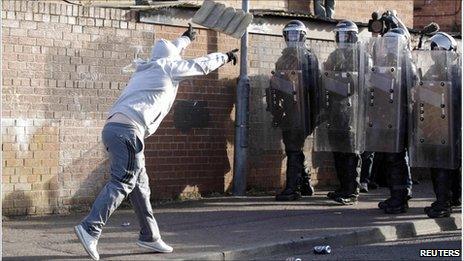
Police responded with water cannon and by firing a number of plastic baton rounds
Community Relations Council sources believe there's been strong positive feedback to their work in the Executive's public consultation on the Cohesion Sharing and Integration strategy.
Defenders of the CRC see any potential assault on the quango as part of a turf war in which the two main Stormont parties want to cut out the middle man and reward their favoured groups in frontline areas.
CRC sources point out that although Sinn Fein politicians portray it as a waste of public money, the majority of the cash the quango distributes doesn't come from the Executive but from outside sources like Europe or the International Fund for Ireland. Accessing that funding might prove extremely difficult if the task is given to 26 separate councils.
Even if both the Parades Commission and the Community Relations Council are replaced, the problems they are there to address remain deep-seated and dangerous.
The DUP leader has been criticised for meeting the UVF in east Belfast after last month's troubles - an approach satirised by Brian Feeney as the paying of "Danegeld" to the paramilitaries.
Simply paying off trouble-makers to restore calm might seem attractive in the short term, but it builds up difficulties for the future.
In fact, in that Stormont committee meeting on 22 June, it was the DUP's Trevor Clarke who gave an example of what can happen.
He told committee members about the bonfires grant scheme in his home patch of Antrim.
Intended as an incentive to promote safer 11th night celebrations, he said it had encouraged other groups to start new bonfires in order to access council cash.
Arranging meetings between youth groups from across interfaces, or victims groups on either side may prove positive, but there are limitations to what can be achieved without progress on wider issues like flags, parades, shared schools and shared housing.
All of which is a big ask. Let's see where we are next July 13th.
PS A Sinn Fein source expressed bemusement at the Orange Grandmaster Edwin Stevenson's speech urging all members to cooperate with the Police Historical Enquiries Team in order to expose the IRA's "bloody sectarian war".
The source wondered whether the advice applied to the HET inquiries which have been causing so much tension within the UVF.